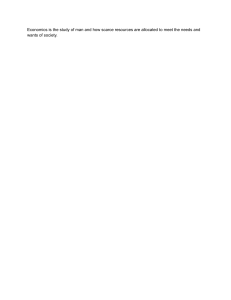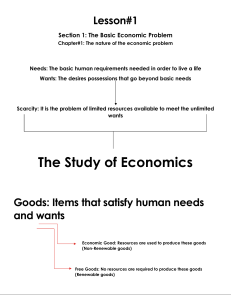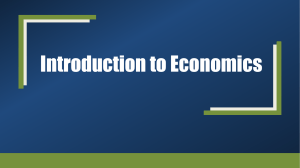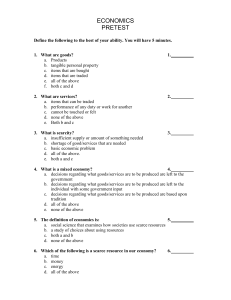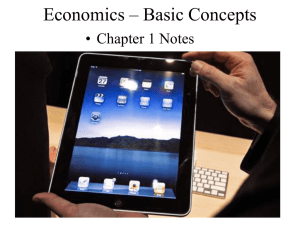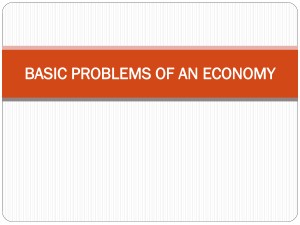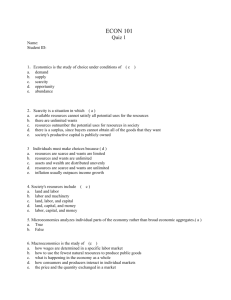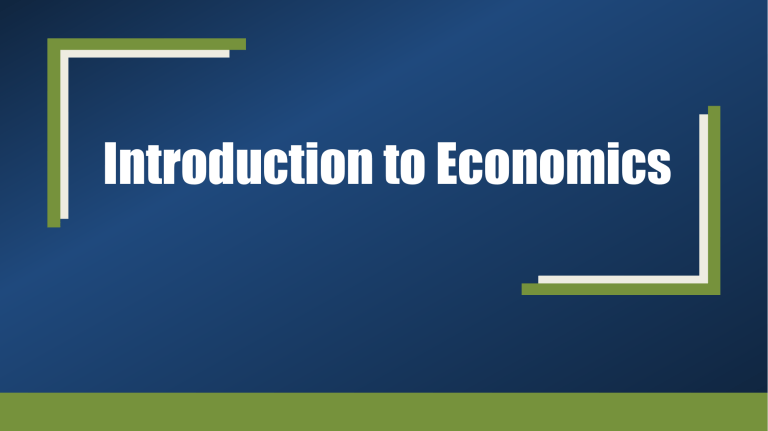
Introduction to Economics Learning Objectives • Identify basic economics problems of the country • Discuss the economic problems affecting economic stability of the country • Analyze and explain the root cause of the economic problems of the country. What is Economics • Is a social science concerned with using scarce resources to obtain the maximum of the unlimited wants of society. • Is the study of how societies use scarce resources to produce commodities and distribute the among different people. • Is the study of production, distribution, selling and use of goods and services. • Is the study of how people use their limited resources to try to satisfy unlimited wants. • Scarcity – the limited nature of resources, which underlies the basic economic problem. • Economic Resources- the problem of having unlimited resources to satisfy them • Natural Resources- came from nature that used in production, including lad, raw materials, and natural process • Capital Resources- the processed materials equipment, and buildings used in production • Human Resources – the efforts of people involved in production, including labour and entrepreneurship • Needs – the essentials of life, such as food and shelter • Wants – desires for non-essential items Scarcity ▪ Is a condition where there are insufficient resources to satisfy all the needs and wants of a population. ▪ Scarcity is the reason why people have to practice economics. Economics, as a study, is the social science that involves the use of scarce resources to satisfy unlimited wants Alfred Marshall described economics as study of mankind in the ordinary business life. It examines part of the individual and social action that is most connected with the attainment and use of material requisites of well-being. Relative Scarcity- Is when a good is scarce compared to its demand. Absolute Scarcity- Is when supply is limited Choice and decision making ▪ Because of the presence of scarcity, there is a need for man to make decisions in choosing how to maximize the use of the scarce resources to satisfy as many wants as possible. Opportunity cost ▪ Refers to the value of the best foregone alternative. Economic resources • Land • Labor • Capital Land • Soil and natural resources that are found nature and are not manmade. Owners of lands receive payment known for rent. Labor • Physical and human effort exerted in production. It covers manual workers like construction workers, machine operators and production workers, as well as professionals like nurses, lawyers and doctors. Capital • Man-made resources used in the production of goods and services which include machineries and equipment. The owner of capital earns an income called interest. Economic as social science • As a social science, economics studies how individuals make choices in allocating scarce resources to satisfy their unlimited wants. 2 Branches of Economics • Macroeconomics • Microeconomics Macroeconomics • Is a division of economics that is concerned with the overall performance of the entire economy. Microeconomics • Studies the decision and choices of the individual units and how these decisions affect the prices of goods in the market. • It also concerned with the process of setting prices of goods that is also known as Price Theory. Basic economic problems of society • What to produce and how much • How to produce • For whom to produce How to produce • Is a question on the production method that will be used to produced the goods and services. This refers to the resource mix and technology that will be applied in production. What to produce and how much • Society must have to decide what goods and services should be produced in the economy. Having decided on the nature of goods that will be produced, the quantity of these goods, should also decided on. For whom to produce • Is about the market for goods. For whom will the goods and services be produced? The young or old, the male or female market, the low-income or the high income groups? Economic systems • Traditional economy • Command economy • Market economy Traditional Economy • Decisions are based on traditions and practices upheld over the years and passed on from generation to generation. Methods are stagnant and therefore not progressive. Command Economy • This is the authoritative system wherein decision-making is centralized in the government or a planning committee. Decision are imposed on the people who do not have a say in what goods are to be produced. This economy holds true in dictatorial, socialist, and communist nations. Market economy • This is the most democratic form of economic system. Based on the workings of demand and supply, decisions are made on what goods and services to produce. People preferences are reflected in the prices they are willing to pay in the market and therefore the basis of the producers decisions on what goods to produce. FIXED ME I AM CRUMBLED Instruction: Fixed the following rumbled letters: SEIPRENTRTE Correct Answer: FIXED ME I AM CRUMBLED Instruction: Fixed the following rumbled letters: ANDL Correct Answer: FIXED ME I AM CRUMBLED Instruction: Fixed the following rumbled letters: APITLCA Correct Answer: FIXED ME I AM CRUMBLED Instruction: Fixed the following rumbled letters: RBOLA Correct Answer: Thank you
